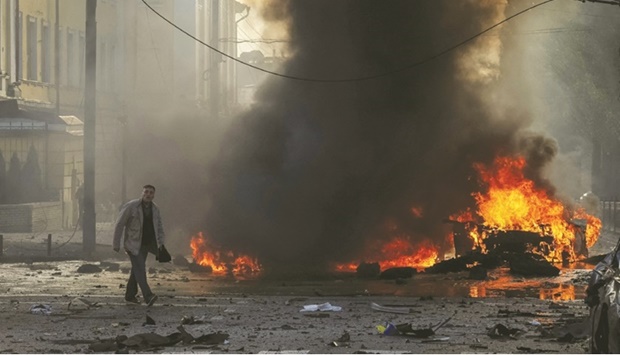President Vladimir Putin has threatened more “severe” attacks against Ukraine after Russian missiles rained down on the capital Kyiv and other Ukrainian cities in what Washington branded “utter brutality”.
Missiles tore into intersections, parks and tourist sites in the capital Kyiv and explosions were reported in Lviv, Ternopil and Zhytomyr in western Ukraine, Dnipro and Kremenchuk in the centre, Zaporizhzhia in the south and Kharkiv in the east.
Ukrainian officials said at least 11 people were killed and scores injured, with swathes of the country left without power.
Thousands of residents raced to bomb shelters as air raid sirens rang out through the day.
The barrage of dozens of cruise missiles fired from air, land and sea was the biggest wave of air strikes to hit locations away from the front line, at least since the initial volleys on the war’s first day, February 24.
The air strikes across Ukraine were in retaliation for an explosion this weekend that damaged a key bridge linking Russia to the Moscow-annexed Crimean peninsula.
“Let there be no doubt,” Putin said in televised comments addressed to his security council, “if attempts at terrorist attacks continue, the response from Russia will be severe”.
Kyiv said that Russian forces had fired more than 80 missiles on cities across the country and that Russia had also used Iranian drones launched from neighbouring Belarus, spurring panic and damaging energy facilities throughout Ukraine.
Putin’s predecessor Dmitry Medvedev warned that the strikes were only “the first episode” of a response to explosion on the Kerch bridge.
However, Ukraine’s Foreign Minister Dmytro Kuleba said the salvo showed that Moscow is increasingly panicked about recent battlefield losses seven months into its invasion.
And his country’s closest allies slammed Russia, with US President Joe Biden saying that the strikes “demonstrate the utter brutality” of Putin’s “illegal war”.
Ksenia Ryazantseva, a 39-year-old language teacher, told AFP that she was awoken by the blasts.
“We saw the smoke, then the cars, and then we realised we didn’t have a window anymore,” she added. “There’s no military target or anything like that here. They’re just killing civilians.”
Ukrainian President Volodymyr Zelensky said the strikes aimed to take down Ukrainian energy infrastructure and regional officials across the country confirmed widespread disruptions.
Russia’s defence ministry meanwhile confirmed that it had targeted Ukrainian energy, military command and communications facilities, claiming that the strikes had been a success and “achieved their aims”.
Kuleba said the attacks had not been “provoked” and that the onslaught was Moscow’s response to a series of embarrassing military losses in eastern Ukraine.
“Putin is desperate because of battlefield defeats and uses missile terror to try to change the pace of war in his favour,” the minister wrote on social media.
Zelensky said he had spoken with the leaders of France and Germany and urged them to “increase pressure” on Russia.
US Secretary of State Antony Blinken weighed in on Twitter, writing: “We will continue to provide unwavering economic, humanitarian, and security assistance so Ukraine can defend itself and take care of its people.”
Ukrainian officials said the central Shevchenkivsky district of the city was hit and that a university, museums and the philharmonic building had been damaged.
An AFP journalist in Kyiv said a projectile landed near a playground and saw smoke rising from a large crater at the impact site.
Trees and benches were charred by the blast and a number of ambulances were at the scene.
In the western city of Lviv, mayor Andriy Sadovyi said there were disruptions to electricity and hot water services after bombardments targeted critical infrastructure.
AFP photographers there saw plumes of black smoke rising above the town’s skyline.
Moldova, west of Ukraine, said several Russian cruise missiles targeting Ukraine had crossed its airspace, and that it had summoned Moscow’s envoy to demand an explanation.
The former Soviet country, which is a candidate to join the European Union, has a small breakaway region, Transnistria, which is armed and supported by Russia.
Within Russia, the strikes were cheered by hawks.
Ramzan Kadyrov, the staunchly pro-Kremlin leader of Russia’s Chechnya region who had recently demanded that military commanders be sacked, wrote: “Now I am 100% satisfied with how the special military operation is being conducted.”
“We warned you Zelensky, that Russia hasn’t even got started yet, so stop complaining... and run! Run away without looking back to the West.”
Belarusian President Alexander Lukashenko, a close ally of Putin’s, meanwhile claimed yesterday that Ukraine is preparing an attack on his country’s territory.
He said Russia and Belarus would “deploy” troops together, without specifying where.
The autocratic leader also accused Ukraine, alongside neighbouring Poland and Lithuania, of training Belarusian militants to carrying out attacks at home.
The strikes across Ukraine came a day after Moscow blamed Kyiv for the blast that damaged a bridge linking Crimea to Russia, leaving three people dead.
The blast that hit the bridge – a symbol of the Kremlin’s 2014 annexation of Crimea – sparked celebrations by Ukrainians and others on social media.
However, Zelensky on Saturday did not directly mention the incident and officials in Kyiv have made no direct claim of responsibility.
The 19km (12-mile) bridge is also a vital supply link between Russia and the annexed Crimean peninsula.

A man is seen near a burned car following a Russian military strike in central Kyiv.
